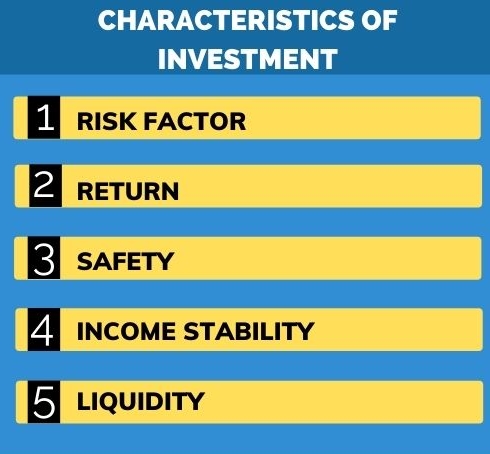Investing is an essential part of the economy. It is suggested that if you have some savings, you should try and invest about 20% of the amount. People utilise investment as a strategy to allocate their money to earn revenue.
It is the method of generating profit from ideal laying resources by converting them into financial assets. Investment refers to purchasing things for future use rather than present consumption and wealth creation.
These assets are bought to earn relevant profits in due course of time. Several investment assets like jewellery, stocks, mutual funds, etc., can be purchased. All of these serve the primary purpose of growth, safety and earnings. Also want to know How to Invest Money?
Need for Investing
There is a need for how to invest money. Two of the primary reasons as to why you should invest are:
- To fight inflation as every year the cost of living in a country increases. Investing money will give you some surplus funds that can be used in balancing the effect of inflation
- To create wealth as it is not wise to keep savings that are stagnating and not growing
Characteristics of Investments

There are several characteristics of an investment. Some of these characteristics are listed below:
- Risk: Every investment comes with a bit of risk. Risk can be anything from the loss of the principal amount invested to a delay in paying dividends. There are different kinds of risks associated with various investments. You can have a mix of securities to balance the amount of risk in your investment amount.
- Return: The primary objective of investing money is to earn some returns. Returns refer to the amount you receive over and above the amount you invest. In simple terms, it is your earning from the investment you make.
- Safety: Safety refers to the assurance that the principal money will be returned or protected without loss. Every investment tool is scrutinised for its level of safety before any funds are allocated to it.
- Income Stability: The term "income stability" refers to consistent income and does not fluctuate. Every investor would want to put their money into assets that will give them a consistent return.
- Liquidity: The ability to sell or convert an investment into cash is liquidity. Simply put, it refers to the ease with which an investment can be converted to cash or sold in the market without incurring a loss. The majority of investors choose to invest in liquid assets.
Importance of Investment

- Generates Income: People can rely on investment as a reliable source of income regularly. One of the essential goals of the investment process is to earn a return which can be either interest or dividends. Investors look for opportunities that offer a higher rate of return while posing a reduced risk. Investment is a good option if you are looking for a stable and steady income. It can act as a secondary source of income for everyone who manages to save any amount of money from their primary income.
- Wealth Creation: Another key role that investing activity plays is in the creation of wealth. It aids investors in accumulating wealth by allowing their cash to appreciate over time. By selling assets at a much greater value than the initial purchase price, investment aids in accumulating significant sums of money. You can put your money into both long-term and short-term investments, depending on your motive. You can generate a good amount of wealth even if you decide to take up some long term investments that come with a steady rate of return.
- Tax Benefits: It allows customers to take advantage of numerous tax benefits while also saving money. Individuals are allowed to save up to Rs. 1,50,000 under section 80C of the Income Tax Act. Many people opt to invest to benefit from a variety of tax benefits. You can either invest in mutual funds or open a PPF account to save your money. These investments are usually stable, and they would even fetch you good returns.
- Economic Development: Investment activities play an essential role in the economy's overall development. It aids in converting people's ideal laying resources into productive ways. Investment is a means of bringing together people who have enough money and those who don't. It facilitates capital formation and contributes to the country's economic progress.
- Meet Financial Goals: People can achieve their long-term financial goals with the help of investment activities. Individuals can increase their wealth by investing in long-term assets. Its primary goal is to provide financial security, increase wealth, and keep people on track for retirement by giving them huge sums of money.
Top 10 Investment Options
You can invest money in different types of securities and options. Some of the popular sources are listed below:
- Direct equity: The term "stocks" is the most commonly used when it comes to investing. Stock investing, on the other hand, is not for everyone.
The stock market is highly volatile, and investing in equities requires a thorough understanding of the market. Not only will you have to choose the appropriate stock,
But you'll also have to choose the best timing to enter and exit the market. However, despite the significant risk, it also yields big rewards. When compared to other investments, the returns are higher.
Simultaneously, unless you employ the stop-loss approach to restrict losses, you risk losing a significant portion, if not all, of your money. A stop-loss order is a purchase order to sell a stock at a specific price placed in advance.
To some extent, you might diversify between industries and market capitalisations to reduce risk. To invest directly in stocks, you'll need a Demat account. - Equity mutual funds: Equity mutual funds are mutual funds that invest primarily in stocks. In the case of an equity mutual fund, at least 65% of the assets must be invested in equities and equity-related instruments.
This is under the Mutual Fund Regulations of India's Securities and Exchange Board (SEBI). An equity fund might be actively or passively managed.
Returns in an actively traded fund are determined mainly by the fund manager's ability to generate returns. Index funds and exchange-traded funds (ETFs) passively managed to track the underlying index.
The market capitalisation of equity funds or the industries they invest in is used to classify them. They are also divided into two categories: domestic and international (investing in stocks from all over the world) - Debt mutual funds: Debt mutual fund schemes are appropriate for investors who want a steady supply of income. They are less volatile and regarded as less risky than stocks funds.
Debt mutual funds invest primarily in fixed-income assets such as corporate bonds, government securities, treasury bills, commercial paper, and other money market instruments.
These mutual funds, on the other hand, are not risk-free. They have risks, including high-interest rates and credit risk. As a result, investors should learn about the risks involved before investing.
National Pension System: The National Pension System (NPS), a long-term retirement-focused investment product, is managed by the Pension Fund Regulatory and Development Authority (PFRDA).
The annual fee for maintaining an NPS Tier-1 account has been reduced from Rs 6,000 to Rs 1,000. All included stocks, term deposits, corporate bonds, liquid funds, and government funds.
You can use NPS to calculate how much of your money to invest in equities according to your risk appetite.
Public Provident Fund (PPF): Compounding tax-free interest has a substantial impact, especially in the later years, because PPFs have a 15-year tenure.
It's also a safe investment because the government backs the interest you earn and the principal you invest. Remember that the PPF interest rate is reviewed by the government every quarter.
Bank fixed deposit (FD): A bank fixed deposit, rather than equity or mutual funds, is a safer investment option in India.
The deposit insurance and credit guarantee corporation (DICGC) guidelines cover each depositor in a bank up to a limit of Rs 5 lakh for both principal and interest as of February 4, 2020.
Previously, the maximum principle and interest coverage was Rs 1 lakh. Depending on one's needs, one can choose among monthly, quarterly, half-yearly, yearly, or cumulative interest options.
The interest rate is applied to one's earnings and taxed under one's tax bracket.
Senior Citizens' Saving Scheme (SCSS): Most retirees' first option is the Senior Citizens' Saving Scheme, a must-have in their financial portfolios. As the name implies, this plan is only for older citizens or early retirees.
SCSS can be applied for at a post office or a bank by anyone over 60. The SCSS has a five-year duration, extending to three years if the scheme matures.
The highest amount invested is Rs 15 lakh, and several accounts can be registered. SCSS interest is paid four times a year and is fully taxed. Keep in mind that the scheme's interest rate is reviewed and adjusted every quarter.
The interest rate on an investment in the scheme, on the other hand, will not vary until the scheme matures. Senior people can deduct up to Rs 50,000 in interest from SCSS in a financial year under Section 80 TTB.
Pradhan Mantri Vaya Vandana Yojana (PMVVY): PMVVY is a savings account for seniors aged 60 and up that pays a 7.4% annual interest rate.
Your pension income may be paid monthly, quarterly, half-yearly, or annually depending on your preferences. The minimum and maximum monthly pensions are Rs 1,000 and Rs 9,250, respectively.
A maximum investment of Rs 15 lakh is allowed under the scheme. This is a ten-year project. The plan will remain in effect until March 31, 2023.
At the end of the term, the elderly citizen refunds the amount invested. In the event of a senior citizen's death, the money will be paid to the nominee.
Real Estate: Your home is for personal use only and should never be viewed as an investment. If you do not intend to live in the second house you buy, it can be used as an investment.
The location of your home is the single most crucial factor that will determine its value and potential rental income. Capital appreciation and rental income are two ways real estate investments pay off.
In comparison to other asset classes, real estate is highly illiquid on the other hand. The other significant risk is securing the necessary regulatory approvals,
Which has been handled significantly since establishing the real estate regulator.
Gold: The use of gold in jewellery raises its own set of concerns, such as safety and cost. Then there are the 'making charges,' which typically run between 6% and 14% of the gold price.
Depending on the complexity of the jewellery, these creating charges can reach up to 25% in some situations. There is still time to purchase gold coins for those who are interested.
Several banks now sell gold coins. Paper gold is a unique way to get gold. Paper gold is less expensive and can be purchased through gold ETFs.
Such an investment is made on a stock market with gold as the underlying asset (NSE or BSE). Investing in Sovereign Gold Bonds is another option to own paper gold.
Conclusion
Investments form an essential part of your income. Some investments are known to be fixed-income, while others are market-linked. If you want to get a steady income, you can invest in fixed-income securities.
However, if you are willing to risk getting good returns, you can go with market-linked securities. You must have an open mind while investing your money. Also, keep researching so that you invest your money judiciously.
Investing not only helps you to grow your money but also helps you in staying financially sound. It is a well known fact that if you invest a certain portion of savings into securities like mutual funds,
It is likely to give you good returns in a small period. Therefore, you should make investment a habit and not keep it as a choice.
Frequently Asked Questions
Q1. Can mutual funds be viewed as risk-free investments?
Mutual funds are a good investment if you are starting with investments. They are not risk-free, but the risk associated with these investments is relatively minimal.
This happens because mutual funds bundle all kinds of securities to mitigate the risk. Several mutual funds range from equity mutual funds to debt mutual funds. You can choose from these based on your risk appetite and financial goals.
Q2. Why should you be investing?
There are several reasons to invest. You can grow the money that you have by investing sensibly. All kinds of investments come with returns. Also, growing your fixed income is always a good option.
There are other reasons for investing too. You can get tax exemption on a maximum of Rs.1,50,000 that you invest. By investing, you can also beat inflation. Ideally, you set a certain amount aside when you save,
But the money doesn't grow. You can instead invest your savings and let your savings grow.
Q3. What is a good way to invest money?
There are several options when it comes to investing. However, you should be clear about why you want to invest money. If you look for crazy returns, you can choose equity options like stocks.
They come with considerable risk, but the risk-taker is equally compensated. If you are looking for a steady return, where you want a small amount to be credited to you every month, you can go with mutual funds.
There are other options like Public Provident Funds, etc., where you can invest to save up some money for your retirement.
Q4. Difference between investing in Direct equity and Mutual Funds?
In the case of direct equity, you will have to keep monitoring the market and take decisions with every passing day. You will decide the kind of stocks you want to invest in and the time of entry and exit from that particular investment.
Here, you can purchase shares at a specific price and sell them higher if the market is favourable. However, in the case of mutual funds, you can set up a SIP and check it once a month.
A mutual fund does not require active decision making. Also, your money will keep accumulating, and you will get the entire amount once the fund matures. There are several mutual funds where you can instantly withdraw money too.
Q5. Will I get steady returns if I invest my money?
The kind of returns you will get will depend on the type of investment you choose. If you go for an FD or RD, you will receive steady returns. However, if you go with securities like shares, you might get very high returns once in a while.
The same is the case with long term investment options like PPF, where you get the money after 10-15 years.
Q6. Can a Mutual Fund assure fixed returns?
Market linked securities generally do not provide fixed returns. However, investing in mutual funds is comparatively safer given the mix of securities in the portfolio. The diverse securities mitigate the risks to a great extent.
Mutual funds are great long term investments as they are known to provide huge returns if steady and regular investments are made to the fund now and then.
However, there is no guarantee of any capital protection in the case of mutual funds.


